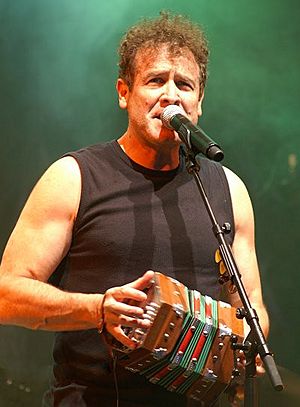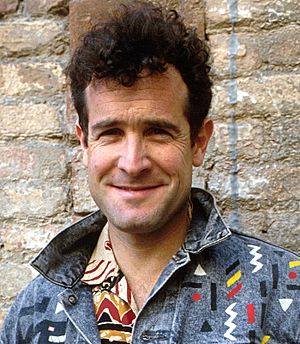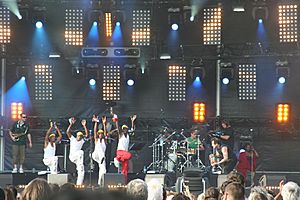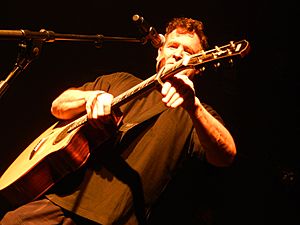Johnny Clegg facts for kids
Quick facts for kids
Johnny Clegg
OBE OIS
|
|
|---|---|

Clegg performing live in 2009
|
|
| Background information | |
| Birth name | Jonathan Paul Clegg |
| Also known as | Le Zoulou Blanc |
| Born | 7 June 1953 Bacup, Lancashire, England |
| Died | 16 July 2019 (aged 66) Johannesburg, Gauteng, South Africa |
| Genres |
|
| Occupation(s) |
|
| Instruments | Vocals, guitar, concertina |
| Years active | 1969–2018 |
| Labels | Capitol Records |
| Associated acts | Juluka, Savuka |
Jonathan Paul Clegg (June 7, 1953 – July 16, 2019) was a famous South African musician, singer, songwriter, and dancer. He was also an anthropologist and worked to fight against apartheid in South Africa. Apartheid was a system of laws that kept people of different races separate and unequal.
Johnny Clegg was sometimes called Le Zoulou Blanc, which means "The White Zulu" in French. He was a very important person in South African music. He was also a well-known white person who stood up against apartheid. His songs often mixed English words with Zulu words. They also blended traditional African music styles with modern Western music.
Contents
Early Life and Musical Beginnings
Johnny Clegg was born on June 7, 1953, in Bacup, Lancashire, England. When he was young, he moved with his mother to Rhodesia (now Zimbabwe) and then to South Africa at age six. He also spent some time in Israel.
As a teenager in Johannesburg, he discovered the amazing music and dance of Zulu migrant workers. He learned the Zulu language, how to play the maskandi guitar, and the isishameni dance style from a musician named Charlie Mzila.
Because he spent time with black musicians, Clegg was often arrested. This was because of apartheid laws that stopped people of different races from meeting after dark. He was first arrested at just 15 years old for breaking these unfair laws.
When he was 16, he met Sipho Mchunu, a Zulu migrant worker. They started making music together in 1969 and called their partnership Juluka.
Juluka: A Unique Band
Juluka was a very unusual band for its time in South Africa. It had a white musician (Johnny Clegg) and a black musician (Sipho Mchunu) performing together. This was against the strict rules of apartheid.
The band grew to six members and released their first album, Universal Men, in 1979. They faced many problems, like being bothered by the police and having their music censored. It was "impossible" for them to perform in public in South Africa.
So, Juluka found creative ways to play their music. They performed in private places like universities, churches, and even people's homes. National radio stations would not play their songs.
Juluka's music was a mix of Zulu, Celtic, and rock styles. Their songs had both English and Zulu lyrics. These lyrics often had hidden political messages about fighting apartheid. Johnny Clegg said that "politics found us," meaning their music naturally became political because of the unfair system around them. He believed in human rights for everyone.
Because of their political messages and having both white and black members, Clegg and other band members were arrested many times. Their concerts were often stopped by the police.
Even though the South African government ignored and bothered them, Juluka became very successful around the world. They toured in Europe, Canada, and the United States. They earned two platinum and five gold album awards.
Juluka broke up in 1985 when Sipho Mchunu decided to go back to his family farm. They reunited briefly in the mid-1990s and released one more album before stopping for good.
Savuka: A New Chapter
In 1986, Johnny Clegg formed a new band called Savuka with another black musician and dancer, Dudu Zulu. This band also blended African music with European styles.
Their first album, Third World Child, sold incredibly well in many European countries, especially France. Savuka went on to record more successful albums, including Heat, Dust and Dreams, which was even nominated for a Grammy Award.
Johnny Clegg and Savuka played concerts both in South Africa and around the world. Clegg refused to stop performing in apartheid-era South Africa, which caused some disagreements with the international movement against apartheid.
In 1993, the band ended after Dudu Zulu was sadly killed while trying to help solve a conflict.
Solo Career and Mandela's Dance
After Savuka, Johnny Clegg released several solo albums.
A very special moment happened in 1999 during one of his concerts. South African President Nelson Mandela joined him on stage! Mandela danced as Johnny Clegg sang "Asimbonanga," a protest song that Savuka had dedicated to Mandela. This song became a powerful anthem against apartheid.
Johnny Clegg's touring schedule became shorter in 2017 because he had surgery for cancer. He performed his very last concert in Harare, Zimbabwe, in November 2018.
Awards and Honors
Johnny Clegg received many awards and honors for his music and his fight for human rights:
- 1991: He was given the Chevalier des Arts et Lettres (Knight of Arts and Letters) by the French Government.
- 2004: He was voted 23rd in the "Great South Africans" list.
- 2012: He received the Order of Ikhamanga, Silver. This is the highest honor a citizen can receive in South Africa.
- 2015: He was made an Officer of the Order of the British Empire (OBE) by the British government.
- He also received several honorary doctorates from universities for his contributions to music and society.
Illness and Death
Johnny Clegg was diagnosed with pancreatic cancer in 2015. He bravely fought the illness, but it sadly led to his death on July 16, 2019. He passed away at his home in Johannesburg, surrounded by his family. He is remembered for his incredible music and his strong spirit in fighting for a better world.
Discography
Juluka Albums
- 1979 Universal Men
- 1981 African Litany
- 1982 Ubuhle Bemvelo
- 1982 Scatterlings
- 1983 Work For All
- 1984 Stand Your Ground (Juluka album)
- 1984 Musa Ukungilandela
- 1997 Crocodile Love
Savuka Albums
- 1987 Third World Child
- 1988 Shadow Man
- 1989 Cruel, Crazy Beautiful World
- 1993 Heat, Dust and Dreams
Solo Albums
- 2002 New World Survivor
- 2006 One Life
- 2010 Human
- 2017 King of Time
See also
 In Spanish: Johnny Clegg para niños
In Spanish: Johnny Clegg para niños
 | Aaron Henry |
 | T. R. M. Howard |
 | Jesse Jackson |




